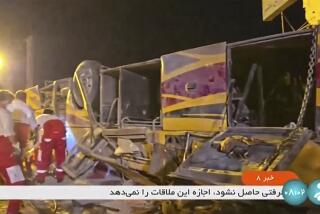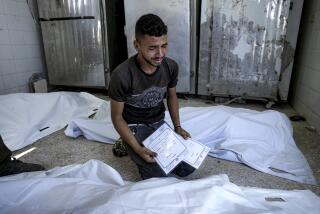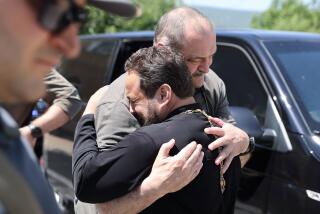Iran says 20 killed in mosque bombing
An explosion Thursday in a mosque near Iran’s southern border with Pakistan killed at least 20 people and probably was carried out by a group seeking to start a war between Shiite and Sunni Muslims, according to Iran’s semiofficial FARS news agency.
The blast, which also wounded more than 50 worshipers, occurred during evening prayers in the town of Zahedan in Sistan-Baluchistan, a tribal region known for drug smuggling and Islamic extremism. Provincial Gov. Ali Mohammed Azad told the official Islamic Republic News Agency that a terrorist group was involved but gave no details.
Azad was quoted on the website of another state news agency as saying that a militant organization “intended to use the insecure conditions in Afghanistan and Pakistan as the country [Iran] prepares to hold its presidential election.”
No group initially claimed responsibility for the assault on the Ali ibne Abitaleb mosque. A second bomb was defused near the building.
Iran, a predominantly Shiite country, has for more than a decade been battling a Sunni militant group known as Jund- allah, or God’s Brigade. The organization has abducted and killed security officials and members of Iran’s Revolutionary Guard. Iranian news reports say the group was responsible for the deaths of 11 soldiers in a 2007 attack near Zahedan.
In April, three men were hanged for involvement in the deaths of 14 people in a bombing at a Shiite mosque in the southern city of Shiraz.
The rugged terrain where Thursday’s attack occurred has been a crossroads of crime and fanaticism fueled by religious extremists in nearby Pakistan and Afghanistan. Drug runners hauling heroin through those countries into Iran have frequent gunfights with police.
Iran says that in the last 20 years, 3,000 of its police officers and border guards have been slain by narcotics traffickers.
The leaders of Pakistan, Iran and Afghanistan met in Tehran, the Iranian capital, over the weekend to discuss curbing Islamic extremism and the influence of the Taliban in Afghanistan.
--
Mostaghim is a special correspondent.
More to Read
Sign up for Essential California
The most important California stories and recommendations in your inbox every morning.
You may occasionally receive promotional content from the Los Angeles Times.











